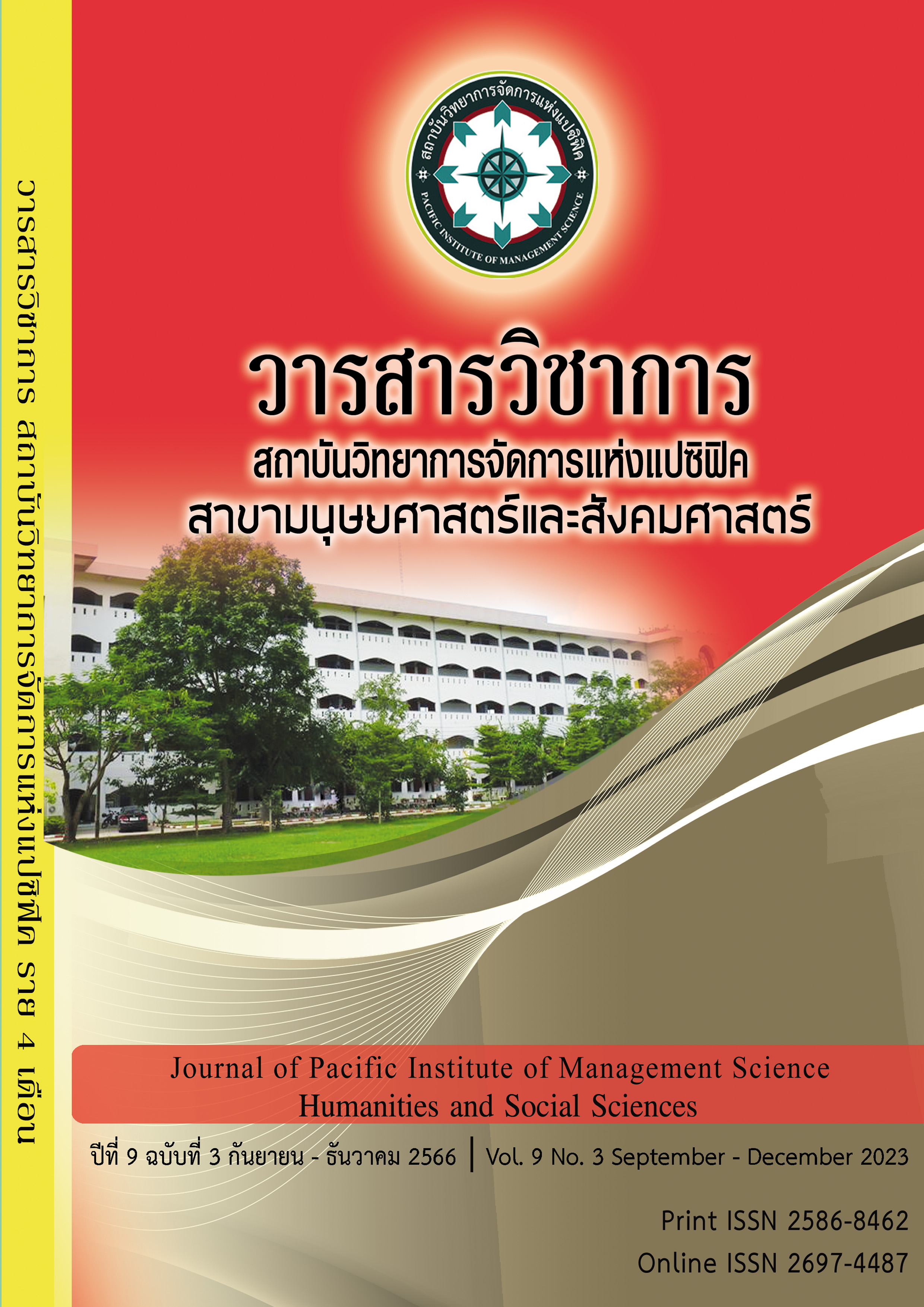Developing Malay Reading Skills Using a Phonics Blends Activity Set For Grade 5 Student at Ban Chok Ko School. Narathiwat Province
Keywords:
Teaching activity setAbstract
The objectives of this research are 1) to compare the development of Malay reading skills before studying and after studying using the Phonics Blens teaching activity set and to study satisfaction of student towards using the Phonics reading aloud teaching activity set. The population and sample were 5th grade students ata Ban Chok Ko School. Narathiwat Province whice is a government school that uses an Islamic studies curriculum (intensive) in the three suuthern boeder provinces of Thailand, numbering 30 students. The research tools include: 1) a teaching pla to develop the pronunciation of Malay words in the format Knicks Grade 5,4 plans, total 8 lessons. 2) Dig into teaching activities to practice reading and pronouncing Malay words used in each plan. 3) Vocabulary practics sets regarding the process of pronouncing Malay word 4) Score sheets and tests to measure knowledge before class (Pre-Test) and after class (Post-Test) 5) Student satisfaction questionnaires Concerning the use of a phonics reading aloud teaching activity set as a 10-item rating scale assessment, the research results found that. The research results found that 1) Academic achievement in developing Malay reading skills using Phonics Blends teaching and learning activities. The pre-test and post-test of student had an average acore of 6.03 points, respectively, and when comparing the scores before studying and after studying. It was found that students’ scores after studying were significantly higher than before studying at the 0.05 level. 2) students’ satisfaction with the Phonics Blends teaching and learning activity set is at the highest level. With amean of 4.69 and a mean standard deviation of 0.58
References
กันต์ดนัย วรจิตติพล. (2542). การพัฒนาแบบฝึกทักษะการเขียนภาษาอังกฤษเพื่อการสื่อสาร สำหรับนักเรียนชั้นมัธยมศึกษาปีที่ 1 โรงเรียนสาธิตสถาบันราชภัฏนครปฐม จังหวัดนครปฐม. (วิทยานิพนธ์ปริญญาศึกษาศาสตรมหาบัณทิต สาขาวิชาการสอนภาษาอังกฤษในฐานะภาษาต่างประเทศ บัณทิตวิทยาลัย). กรุงเทพมหานคร: มหาวิทยาลัยศิลปากร.
กุณฑิกา พัชรชานนท์ และบัลลังก์ โรหิตเสถียร. (2561). ปลอด นร. อ่านไม่ออกเขียนไม่ได้. [ออนไลน์]. ค้นเมื่อวันที่ 20 ธันวาคม 2566, จากhttp://www.moe.go.th/moe/th/news/detail.phd?NewsID=40010&Key=news_act 2558.
จารุวรรณ สายสิงห์. (2546). การผสมสานการเรียนการสอนแบบโฟนิกส์และการสอนแบบโดยรวมเพื่อส่งเสริม ความสามารถในการอ่านออกเสียง ความเข้าใจในการอ่านการเขียนสะกดคำและความคิดเห็นต่อการอ่าน ภาษามลายูของนักเรียนประถมศึกษาปีที่ 5. (วิทยานิพนธ์การศึกษามหาบัณฑิต วิชาการสอนภาษาอังกฤษ). เชียงใหม่: มหาวิทยาลัยเชียงใหม่.
จีรนันท์ เมฆวงษ์. (2547). การพัฒนาความสามารถในการออกเสียงภาษาอังกฤษและความคงทนในการเรียนรู้คำศัพท์ด้วยวิธีการสอนแบบโฟนิกส์. (วิทยานิพนธ์การศึกษามหาบัณฑิตวิชาการสอนภาษาอังกฤษ). เชียงใหม่: มหาวิทยาลัยเชียงใหม่.
ชัยยง พรหมวงค์. (2551). นวัตกรรมการศึกษา. กรุงเทพมหานคร: ธรรกมลการพิมพ์.
ดวงรัตน์ แซ่จง. (2561). การพัฒนาทักษะการอ่านออกเสียงสะกดคำภาษาอังกฤษโดยใช้แบบฝึกทักษะการอ่านออกเสียงโฟนิกส์ (Phonics) ของนักเรียนระดับชั้นประถมศึกษาปที่ 3 โรงเรียนทรงวิทยาเทพารักษ์. [ออนไลน์]. ค้นเมื่อวันที่ 20 ธันวาคม 2566, จาก https://so05.tci-thaijo.org/index.php/Patanasilpa/article/view/261384/175857
ดวงใจ ตั้งสง่า. (2557). ชวนลูกเรียนรู้ภาษาอังกฤษ ตอน โฟนิคส์คืออะไร ทำไมต้องเรียน. [ออนไลน์]. ค้นเมื่อวันที่ 20 ธันวาคม 2566, จาก http://teamkru.com/th/โฟนิคส์คืออะไร ทำไมต้องเรียน/, 2555-2556.
ปรียา โนแก้ว และประนุท สุขศรี. (2548). รายงานการวิจัย เรื่อง ข้อมูลพื้นฐานการจัดการเรียนการสอนภาษาต่างประเทศในภาคเหนือ. กรุงเทพมหานคร: สำนักงานกองทุนสนับสนุนการวิจัย.
Wilkins, D. A. (1972). Linguistic in Language Teaching. Cambridge: MIT Press.
Downloads
Published
Issue
Section
License
Copyright (c) 2023 Pacific Institute of Management Science

This work is licensed under a Creative Commons Attribution-NonCommercial-NoDerivatives 4.0 International License.
บทความที่ได้รับการตีพิมพ์เป็นลิขสิทธิ์ของ สถาบันวิทยาการจัดการแห่งแปซิฟิค
ข้อความที่ปรากฏในบทความแต่ละเรื่องในวารสารวิชาการเล่มนี้เป็นความคิดเห็นส่วนตัวของผู้เขียนแต่ละท่านไม่เกี่ยวข้องกับสถาบันวิทยาการจัดการแห่งแปซิฟิค และคณาจารย์ท่านอื่นๆในสถาบันฯ แต่อย่างใด ความรับผิดชอบองค์ประกอบทั้งหมดของบทความแต่ละเรื่องเป็นของผู้เขียนแต่ละท่าน หากมีความผิดพลาดใดๆ ผู้เขียนแต่ละท่านจะรับผิดชอบบทความของตนเองแต่ผู้เดียว







